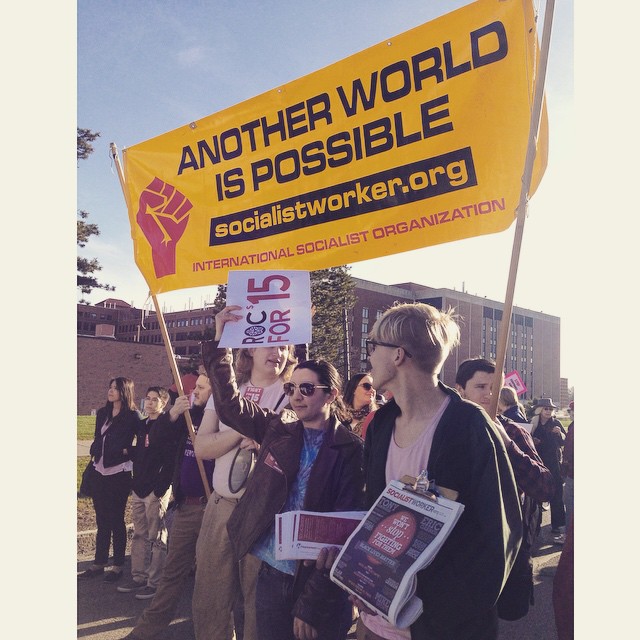"Republicans want to call people socialists because it relates to Obama," Sam Trapp, a RIT alum and member of the Rochester chapter of the International Socialist Organization (ISO), said. "And socialists don't support Obama. But the big problem is that people equate socialism to the Stalinist block of the USSR."
The ISO itself is a multi-national organization which subscribes to the Marxist teaching of "socialism from the bottom," which, in other words, refers to actions that focuses on power derived from members of society disenfranchised by the capitalist system. These groups include minorities, members of the LGBT community and the impoverished.
"The first time I went to a socialist meeting, I just really got it," Trapp said. "Some of the issues they were discussing at the time were issues like abortion rights, and defending gay and trans rights. Immediately, they were talking beyond just marriage equality. And then there was anti-racist stuff. There's a lot of non-racist politics going on, like color blindness. But the ISO are specifically anti-racist, and openly fight against racism."
Trapp went on to explain how the dilemma of class fuels racism, sexism and discrimination.
"A person of color in the Oval Office is probably not struggling the same way as a black family in the inner city of Rochester," Trapp said. "There's a clear class divide, of course that is an extreme example, but it comes from place where we always look at how class intersects a lot of these issues. A lot of the modern left are dealing with this issue of intersectionality, of how racism, sexism and homophobia all overlay over each other, and our argument is that capitalism is perpetuating. There's a lot of arguments that capitalism invented modern racism, that it keeps workers fighting among themselves rather than rising up against the bosses."
This philosophy is one echoed by four-time socialist presidential candidate Eugene V. Debs, This has become an area of contention among scholars. As Cornel West of the National Democratic Socialists of America argues, there are four interpretations of racism found in the socialist theory: the first being a general rule of exploitation of the working class, the second of racism being a presence in the workplace (but denying its existence outside), the third being the cause of colonizer/colonized dynamic, wherein the oppressed are those who do not fit into the general culture norms and the fourth being that racism itself is a presence on a psychological level, and is essentially omnipresent. What becomes apparent is that discrimination in and of itself is a far more complex issue than strict Marxist ideology can offer an encompassing explanation for.
On a large-scale political level, socialism becomes more fragmented. For example, Trapp denounces both Obama and Sanders on account of their affiliation with the Democratic Party. Obama, in particular, Trapp takes objection to for his open endorsement of drone warfare. Both candidates are denied by the ISO for riding the donkey, so to speak, with the Democratic Party seen as a symbol of a broken two-party political system.
Above all else, Trapp urges people to keep ever vigilant in terms of what society presents them.
"Always be aware of the propaganda that the capitalist culture puts in front of you," Trapp said. "And really try to read into the message behind it."








